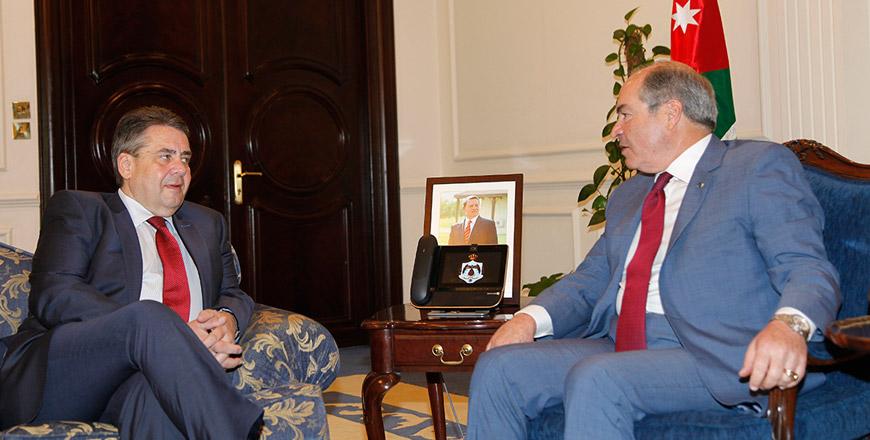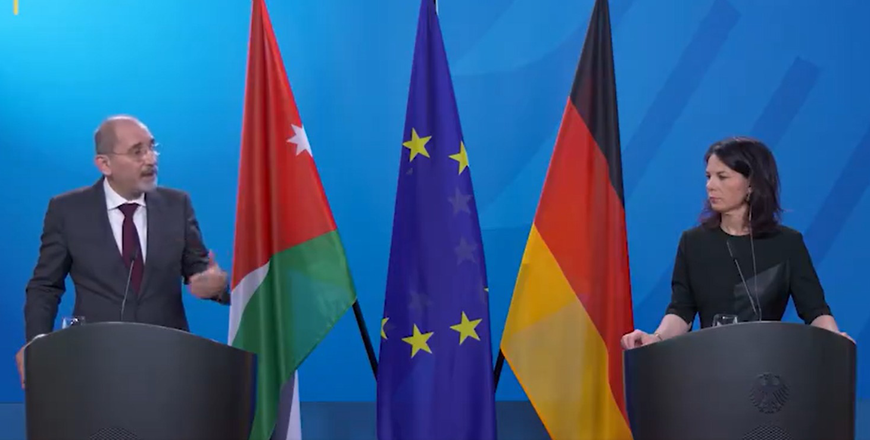You are here
PM, Safadi meet German minister over regional issues
By Dana Al Emam , Petra - Apr 24,2017 - Last updated at Apr 24,2017

Prime Minister Hani Mulki meets German Minister for Foreign Affairs and Vice Chancellor Sigmar Gabriel in Amman on Monday (Petra photo)
AMMAN — Prime Minister Hani Mulki on Monday met with German Minister for Foreign Affairs and Vice Chancellor Sigmar Gabriel over bilateral ties and regional developments.
The premier acquainted the visiting official with the repercussions suffered by Jordan in light of the regional instability, citing the Syrian crisis and its 1.3 million refugees currently in the Kingdom.
Such circumstances have placed great pressure on the Kingdom's resources and budget, as well as its education, health, water, and infrastructure sectors, Mulki stressed, adding that the Jordan Armed Forces-Arab Army and other security apparatus have had to double their efforts in this regard, the Jordan News Agency, Petra, reported.
Over the past few years, Jordan has set up a number of infrastructure projects to improve the level of basic services presented to citizens and refugees, the premier said, stressing that the operational costs to sustain such schemes have contributed to draining national assets.
The prime minister outlined Jordan's economic reforms designed to help reduce the budget deficit and stimulate economic growth, adding that indicators showed debt rates to be relatively stable.
For his part, Gabriel expressed his country's appreciation for Jordan's role in the region, highlighting the importance of supporting the Kingdom that plays a major part in bringing about peace and stability in the Middle East, Petra reported.
Also on Monday, Foreign Minister Ayman Safadi met with the German vice chancellor who reiterated his country’s keenness to support Jordan and its efforts to spread peace in the region, urging the international community to shoulder its responsibilities towards the Kingdom.
During a joint press conference, the German official highlighted the “good and deep” relations between the two countries at the political and people’s levels, saying that they constitute the basis for Germany’s support to Jordan’s resilience in the current regional outlook.
“We are humbled by what countries like Jordan and Lebanon provide to Syrian refugees compared to what we provide,” he said, noting that Germany, with a population of some 80 million only received 1 million Syrian refugees, while a country like Jordan, with a population of nearly 9.5 million, hosts nearly 1.3 million Syrians. He acknowledged the increased pressure on educational, housing and health services.
Regarding the Syrian conflict, the two officials agreed on the need to advance towards a peaceful solution approved by the consensus of Russia and the United States, as well as the EU and Arab countries, including Jordan, as Syria’s neighbours are directly affected by the crisis.
“There is no solution to the Syrian conflict without Russia,” Safadi stressed.
Gabriel underscored the need for Germany and the European Union to continue supporting Jordan to face regional challenges and alleviate the burdens and repercussions of regional unrest.
For his part, Safadi said the two countries enjoy “special” relations, and commended Germany’s continuous support to Jordan, particularly in development and infrastructure projects, as well as in addressing the needs of refugees in Jordan and enhancing educational and cultural cooperation.
He noted that the two states agreed on the need to exert political efforts to revive the Palestinian-Israeli negotiations based on the two-state solution, noting that a peaceful solution to the conflict, which is central to the region, will help bring stability back to the region.
He added that the Arab summit, held in Jordan recently, had reiterated the Arab states’ commitment to the Arab Peace Initiative as the most comprehensive option to solve the Palestinian-Israeli conflict.
Gabriel agreed that there must be no unilateral efforts in this regard, and that all moves should be made following political agreements, adding that improving the economic conditions of Palestinians in the West Bank and Gaza will be for the benefit and safety of Israel and the international community at large.
The two officials also agreed to pursue cooperation in the fight against terrorism at the military, security and ideological levels, Safadi added.
“We will continue to work together to ensure an environment of respect and peace,” the minister concluded.
Related Articles
AMMAN — Germany on Sunday announced that it would grant Jordan a $100-million unconditional loan to support the Kingdom's economic reform pr
AMMAN — Deputy Prime Minister and Foreign Minister Ayman Safadi on Tuesday, during a press conference with German Foreign Minister Annalena
AMMAN — Foreign Minister Ayman Safadi and Minister of State at the German Federal Foreign Office Niels Annen on Sunday discussed bilateral r


















